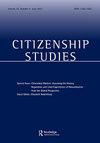马歇尔和达伦多夫:1945-2022年的公民理论
IF 1.9
3区 社会学
Q3 POLITICAL SCIENCE
引用次数: 0
摘要
摘要1945年至2022年间,公民身份研究的发展和公民身份的变化以英国为特别参考。尽管公民身份的概念早在希腊政治思想中就已经确立,但基于福利国家的公民身份的发展始于战后英国关于教育、健康和福利的立法。早期的公民社会学是英国的T·H·马歇尔和德国的拉尔夫·古斯塔夫·达伦多夫的著作。这两位社会学家建立了一个仍然具有影响力的词汇和研究议程,包括社会公民身份、文明、生活机会和公共文化等基本概念。战后英国的解决方案涉及资本主义改革战略,在撒切尔时代(1979年至1990年),新自由主义成为主导的政治经济范式,这一解决方案开始分崩离析。这一时期出现了“赌场资本主义”的产生,福利国家的侵蚀,或者用撒切尔的话来说是“保姆国家”。尽管二十世纪的公民身份是基于相同和团结的概念,但公民身份研究必须解决日益增加的社会和文化多样性、全球难民危机、社会权利与人权之间的关系、人口危机,尤其是公民身份的侵蚀。本文章由计算机程序翻译,如有差异,请以英文原文为准。
Marshall and Dahrendorf: theories of citizenship 1945-2022
ABSTRACT The development of citizenship studies and changes in citizenship is examined between 1945 and 2022 with special reference to Britain. Although the idea of citizenship was established as early as Greek political thought, the development of citizenship based on a welfare state starts in Britain with post-war legislation on education, health, and welfare. The early sociology of citizenship was the work of T. H. Marshall in Britain and Ralf Gustav Dahrendorf in Germany. These two sociologists established a vocabulary and research agenda that has remained influential including basic concepts such as social citizenship, civility, life chances, and public cultures. The post-war settlement in Britain that involved a strategy for the reform of capitalism began to come apart during the Thatcher Years (1979–1990) in which neo-liberalism became the dominant political-economic paradigm. This period saw the creation of ‘casino capitalism’, the erosion of the welfare state or in Thatcher’s words ‘the Nanny State’. Whereas citizenship in the twentieth century was based on notions of sameness and solidarity, citizenship studies have to address increasing social and cultural diversity, a global refugee crisis, the relationship between social and human rights, a demographic crisis, and above all the erosion of citizenship.
求助全文
通过发布文献求助,成功后即可免费获取论文全文。
去求助
来源期刊

Citizenship Studies
POLITICAL SCIENCE-
CiteScore
3.60
自引率
11.10%
发文量
85
期刊介绍:
Citizenship Studies publishes internationally recognised scholarly work on contemporary issues in citizenship, human rights and democratic processes from an interdisciplinary perspective covering the fields of politics, sociology, history and cultural studies. It seeks to lead an international debate on the academic analysis of citizenship, and also aims to cross the division between internal and academic and external public debate. The journal focuses on debates that move beyond conventional notions of citizenship, and treats citizenship as a strategic concept that is central in the analysis of identity, participation, empowerment, human rights and the public interest.
 求助内容:
求助内容: 应助结果提醒方式:
应助结果提醒方式:


